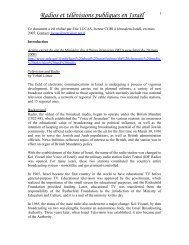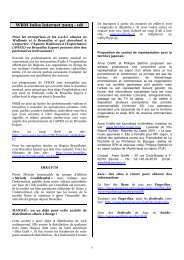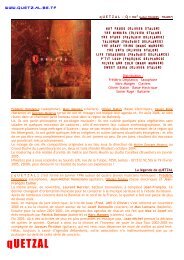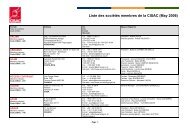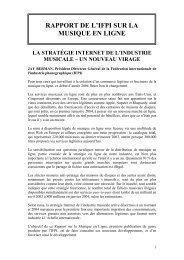Create successful ePaper yourself
Turn your PDF publications into a flip-book with our unique Google optimized e-Paper software.
INTRODUCTIONMusic has embraced the future with new business models –will governments secure a future for digital content?By John Kennedy, chairmanand chief executive, IFPI.The recorded music industry is reinventingitself and its business models. Our world in2009 looks fundamentally different from howit looked five years ago. Record companieshave changed their whole approach to doingbusiness, reshaped their operations andresponded to the dramatic transformation inthe way music is distributed and consumed.The music business, like others, goesinto 2009 under the uncertain cloud ofthe global economic downturn. However,we are no stranger to the need toreform, restructure and reinvent. Recordcompanies began this process manyyears ago. They are, I believe, as a result,better placed than many other sectors tomanage through more difficult times.There are some very positive stories inthis report about innovation and changeinside today’s music business. First, recordcompanies are building an economic futurebased not just on selling music but on“monetising” consumer access to it. Nokia’sComes With Music service, launched inOctober 2008, embodies that concept, withmusic free and unlimited, bundled into thecost of a mobile phone. So do the newlink-ups between music companies and ISPs,from Sky in the UK to TDC in Denmark andother European ISPs. These are just tastersof the enormous potential for licensing andgenerating commercial value from music atevery point where the consumer is likely towant it. Meanwhile, as this report goes topress Apple announced it had signed dealswith leading record companies to offer eightmillion DRM-free tracks at flexible price points.Increasingly our partners in these ventures,grappling with consumer demand problemsof their own, are seeing the opportunity ofadding music to the value of their offering.One impressive statistic in this report is theconfirmation by Danish telecoms companyTDC that its music service has produceda very significant and measureable impactin retaining its broadband and mobilephone customers. That is a powerfultestimony to the commercial value ofmusic and it will strike a chord amongISPs and mobile operators elsewhere.The second dominant theme of this reportis the part that record companies – alsoreferred to in this report as “music” companiesto reflect their expanding role – continue toplay in bringing to market the vast majorityof acts that music fans enjoy. The idea thatthe digital world somehow diminishes theimportance of music companies is simplya myth. On the contrary, in a world where amultitude of aspiring artists are competingfor visibility among millions of consumers,the music company role can only becomemore important in the digital future. Theinvestment, skills, services and creativeadvice that labels provide remain as corea function of the music business as ever.“Governments are beginning toaccept that, in the debate over‘free content’ and engagingISPs in protecting intellectualproperty rights, ‘doing nothing’is not an option.”John Kennedy, Chairmanand Chief Executive of IFPIFinally, there is a momentous debate goingon about the environment on which ourbusiness, and all the people working in it,depends. This is a debate about the futurenot just of music but of all creative industriesin a digital era where the very principle ofgetting rewarded for creative work is at risk.The vast growth of unlawful file-sharingquite simply threatens to put the wholemusic sector out of business. This reportreflects the wide consensus, from majorand independent record companiesto managers and politicians, that anew approach is needed to protectcopyright – one that involves sharingresponsibility across the value chain.The debate has a huge way to go, but thecampaign for ISPs to act as proper partners inhelping protect intellectual property is makingprogress. Governments are beginning tounderstand the scale of the challenge of tryingto monetise content in an environment wherearound 95 per cent of all music is downloadedwithout payment to artists or producers.France is leading the drive towards ISPcooperation, understanding that it is the futureof French creative industries that are at stake.The UK and a growing number of countrieshave progressed along a similar route in 2008and momentum will build further in 2009.This report tells the story of the musicbusiness as it is developing today. Music is theengine and heart of a large number of diversebusinesses and demand for the product isgrowing year-by-year. Music companies arechanging their business models and refiningtheir skills in bringing artists to an ever morecomplex and sophisticated marketplace.Governments are beginning to acceptthat, in the debate over “free content” andengaging ISPs in protecting intellectualproperty rights, doing nothing is not anoption if there is to be a future for commercialdigital content. The big question for 2009 –with the focus in particular on France andthe UK - is what real action will result andhow quick and how effective it will be inreversing the devaluation of recorded musicand helping return the industry to growth.3



